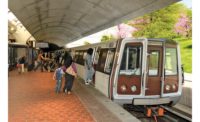Stowe, Pa.-based Universal Concrete Products, which supplied hundreds of defective precast panels for the $2.7 billion Silver Line light rail extension in northern Virginia, has received a three-year ban on participating in federally financed transportation projects. Imposed by the Federal Transit Administration, the ban makes Universal ineligible for contracts, grants, loans or other financial assistance from agency of the federal government until the end of 2023.
Universal manufactured more than 1,500 precast exterior wall panels for the project’s five above-ground stations under a $6.1 million contract with Capital Rail Constructors (CRC), a design-build team led by Clark Construction Group and Kiewit Infrastructure South that is constructing the 11.5-mile extension of Washington, DC’s Metrorail system for the Metropolitan Washington Airports Authority (MWAA). CRC’s quality control checks during the panels’ initial installation in 2017 revealed numerous instances of high water content and low air entrainment, potentially compromising long-term durability. In addition, 65 panels that failed to meet the specified 1.5-in concrete coating over rebar were replaced.
A subsequent U.S. Dept. of Transportation investigation found that Universal had knowingly bypassed quality control requirements and falsified test documents over 18 months while the panels were being manufactured. The company’s quality-control manager was fined $1.4 million after pleading guilty to federal charges of conspiracy to commit wire fraud for his role in altering the test data to indicate that the panels were acceptable. Last year, Universal reached a $1 million settlement agreement in a civil lawsuit brought by the Commonwealth of Virginia and the U.S. Department of Justice.
Brad Parrott, an attorney representing Universal, says his client, "did not receive notice of the proceeding until after the debarment. Accordingly, UCP will be seeking reconsideration of this administrative action."
The defective panels are among multiple construction issues that have left the Silver Line extension more than two years behind its original 2019 completion schedule. The Washington Metropolitan Area Transit Authority, which is slated to assume operation and maintenance of the Silver Line next year, will not accept the project without an acceptable long-term CRC-funded strategy to ensure the panels maintain the contractually specified 100-year service life.
Inspections of more than 1,600 panels conducted for WMATA this past summer by DiSimone Consulting Engineers found 184 units with a total of 342 cracks. Of those 342 cracks, 146 met or exceeded the .005 inch threshold. Under the project’s technical specifications, cracks with widths of 0.005 inches or greater must be repaired.
Although CRC has suggested that the panel integrity could be maintained by reapplying two coats of a silane sealant every 10 years, an analysis conducted for WMATA’s Office of Inspector General (OIG) by Dallas-based forensic consultant Structural Services Inc. recommends four-coat applications at intervals of 5 to 7 years.
In a September 2020 report to WMATA’s Board of Directors, the OIG criticized CRC’s proposed amount for escrow “because it does not account for future repair of cracks, application of four or more coats versus two coats with each reapplication of the solution, replacement of panels, and other costs over and above normal maintenance costs and operation impact.”
Project spokesperson Marcia McAllister says MWAA continues to work with CRC and WMATA to address problems identified by the OIG’s office.
“Our goal is to continue a variety of testing and to compete construction early spring and turn the project over to WMATA,” McAlister says, adding that WMATA plans to begin service on the extension in July 2021.




Post a comment to this article
Report Abusive Comment